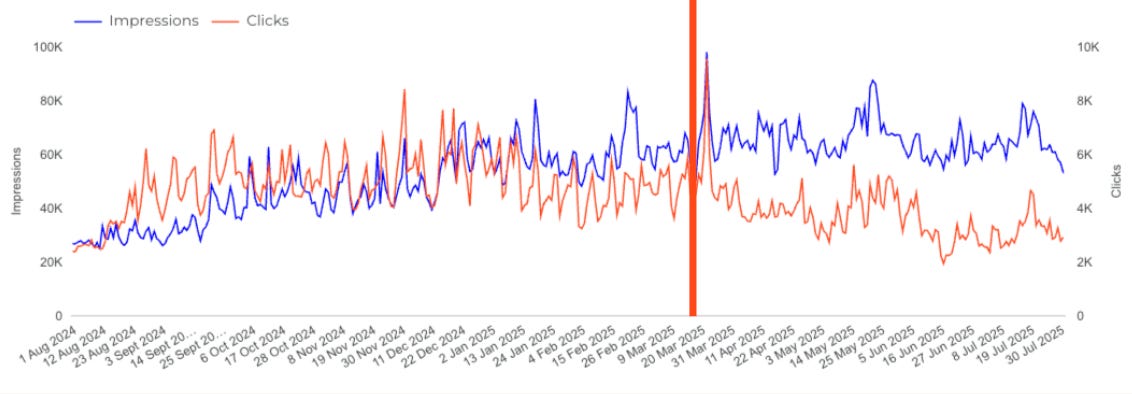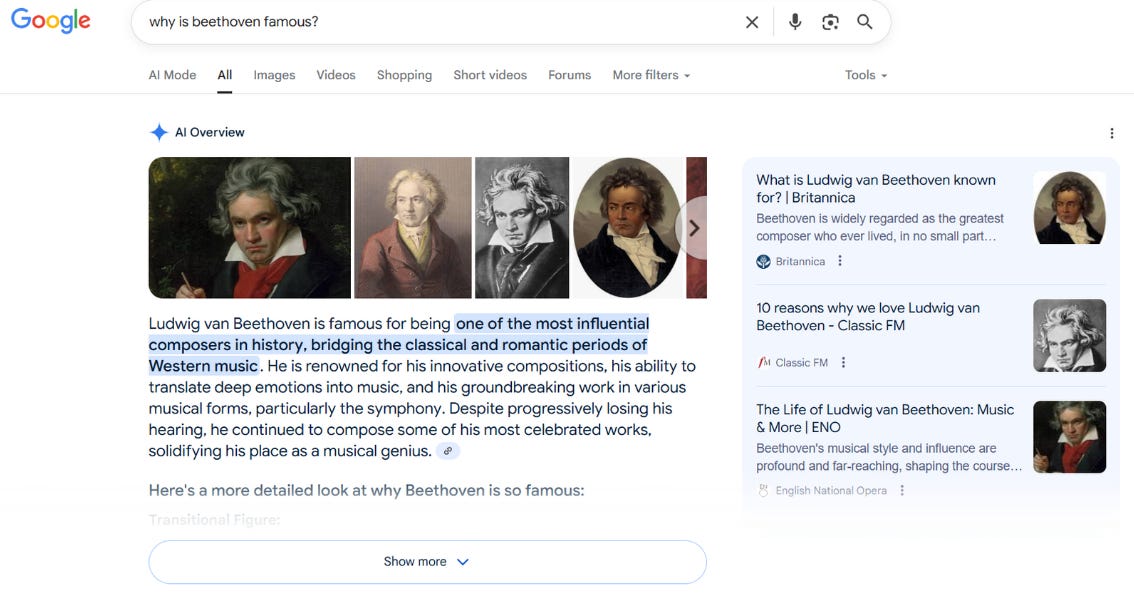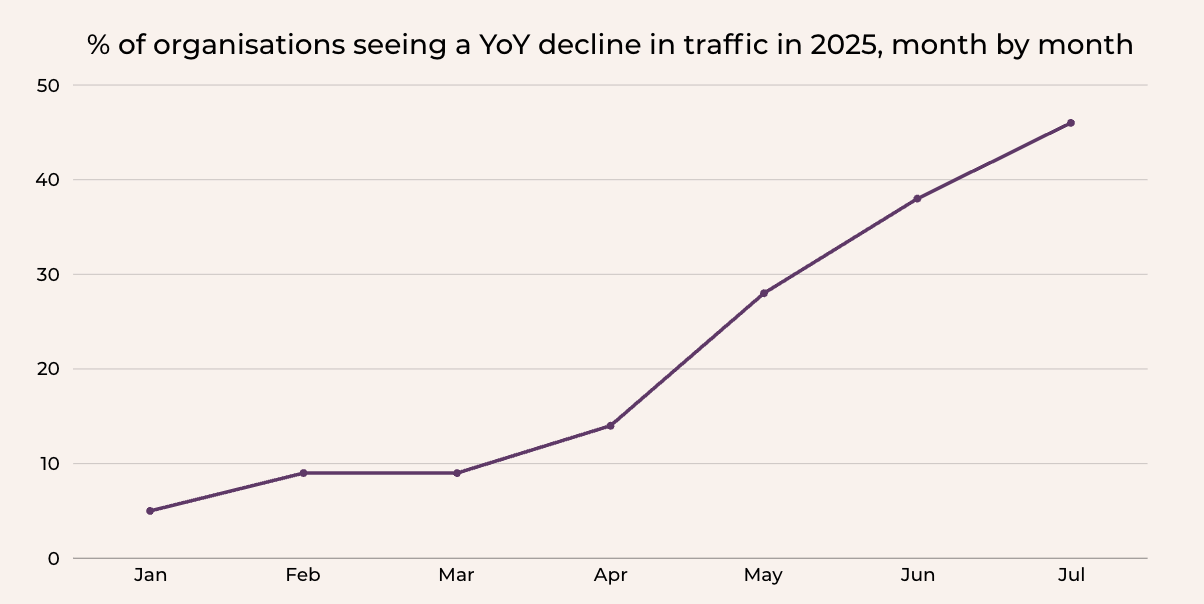How are Google's AI Overviews affecting search traffic for arts and culture websites?
The results of a study looking at how changes to search results are shaking out
Hi there.
This week, I’ve got a guest post from a couple of my One Further colleagues: Beth Downs (Content Analyst - SEO) and Chris Unitt (Founder).
For a long time, search engines (mostly Google) have been one of the most important digital channels for cultural organisations. But Google’s new AI Overviews are changing how audiences find your content and whether they click through at all.
To find out how this has been impacting cultural organisations, Beth and Chris analysed search data for 100 UK cultural organisations. Spoiler alert: it’s not good news. They also have some suggestions as to what you might want to do about it.
Over to them…
What happens when Google stops being the gateway to your content and starts becoming the destination itself?
Over the past few months, Google's AI Overviews have been quietly reshaping how people search. For cultural organisations that have relied on search engines for 40–60% of their website traffic, it’s potentially the start of a major shift.
AI Overviews now appear at the top of results for millions of queries, delivering instant answers that often mean people don't need to click through to your site.
We’d seen noticeable dips in search traffic in some clients’ Google Analytics accounts, and had started to receive a few ‘What’s going on with this?’ emails, too. To make sure we were speaking sense, we wanted to get a handle on the bigger picture.
So we analysed search data from 100 UK arts and culture organisations to see what’s going on. We’ve written everything up in a report that you can download here.
But for you esteemed Cultural Content readers, here’s a summary.
What we found
These are the headlines:
There was a 10% drop in organic search traffic across the group from January to July 2025, compared to a 30% rise over the same period in 2024.
AI Overviews were expanded to cover entertainment and travel-related queries at the end of March 2025, and the impact of that is pretty clear. Since then, more and more organisations are seeing their year-on-year search traffic decrease (see chart).
In 2025, 80% of organisations are receiving less traffic from Google than they did in 2024. A further 13% have increased their search traffic, but at a slower rate than in 2024.
Informational content has taken the biggest hit - visitor guides, glossaries, and entry-level articles.
Event and exhibition pages haven’t been impacted so much.
On average, arts organisations appear in 6% of relevant AI Overviews, with top performers at 13%.
Where the impact is hitting hardest
Content hubs have seen some of the sharpest drops, especially entry-level guides designed to catch the eye of newer audiences.
The mechanics of what's happening are quite interesting. Traditionally, there's been a fairly predictable relationship between search impressions and clicks - more visibility generally meant more visits, with the ratio staying relatively stable. But AI Overviews have disrupted this pattern.
SEO experts are calling it the 'crocodile mouth effect' because it looks like this.

Impressions continue to rise – people are still seeing your content mentioned in search results – but clicks are falling because they're getting their answers directly from AI Overviews without needing to visit your site. The gap between visibility and actual traffic keeps widening.
For some types of organisation (especially those with ad-reliant business models where search has been a significant channel) this is becoming a problem. And while that doesn’t describe many arts organisations, it could affect the local news and listings websites that help to promote them.
It’s not all bad news
Event and exhibition pages, with their transactional intent and time-sensitive relevance, are proving more resilient, especially where an organisation is responsible for its own ticket sales.
And not every organisation is losing visibility. Those with strong SEO foundations are faring better. And while AI Overviews may reduce clicks, being cited within them still matters for reach, authority, and influence.
What should you do about this?
Firstly, it’s worth figuring out whether this is likely to be a big deal for your organisation or not. It might not be. But if it is, here are a few things for you to consider…
Get your content into AI Overviews. There might be less traffic up for grabs, but organic search still matters. We’ve seen some organisations doing better than others in this new landscape, and it’s because they’ve worked on the SEO fundamentals.
That is: good content that responds to search demand and intent, that’s well organised, and that uses clear and concise language. Quoting and crediting named experts can boost trust signals, too.
Diversify beyond Google. If you’re getting less traffic from Google and that’s a problem for you, then think about where else you can make up the numbers. This might include building a stronger presence on YouTube or taking a different approach to social media platforms.
If you’re eligible for a Google Ad Grant, then that could be very valuable in offsetting organic search declines, and testing AI Max for Search campaigns can help reach people in new ways. Some related reading: The Arts and Culture Google Ad Grant Report 2025.
Get strategic. You could use this as an opportunity to re-examine your overall digital content strategy. How could you protect your organisation from being buffeted by these sorts of platform changes? Could you even develop a self-sustaining digital content offer that isn’t so reliant on a constant influx of new traffic?
The bigger picture
Google seems to be shifting from being a signpost to being a destination. If you’re focused on ticket sales and visits, then you might not have felt any particularly strong effects yet.
But if your wider mission depends on your discoverability online, then you may need to think about adapting.
Volumes of search traffic from pre-2024 may not be coming back, but with the right optimisation, diversification, and audience-building strategies, it is possible to stay visible and relevant in this new search ecosystem.
And if you’d like a hand understanding and thinking through the impact of this on your organisation, get in touch with One Further for a chat.





We’re doing a lot of GEO work at the agency that I’m at.
First thing: you can track LLM referrals. Arrange your tracking metrics to now track and compare the growth of LLM traffic specifically.
AI Overview traffic is still lumped in on GSC, but you can get a grip on other sources like Perplexity and ChatGPT.